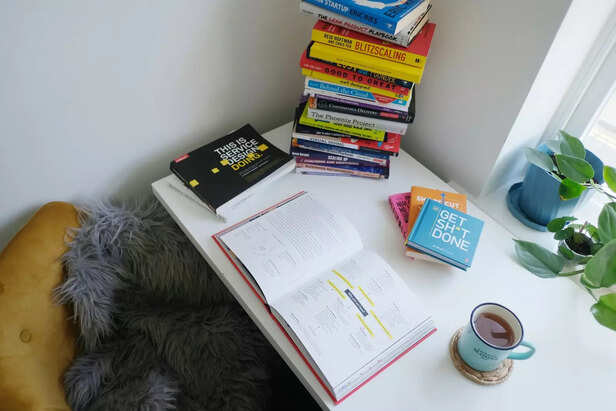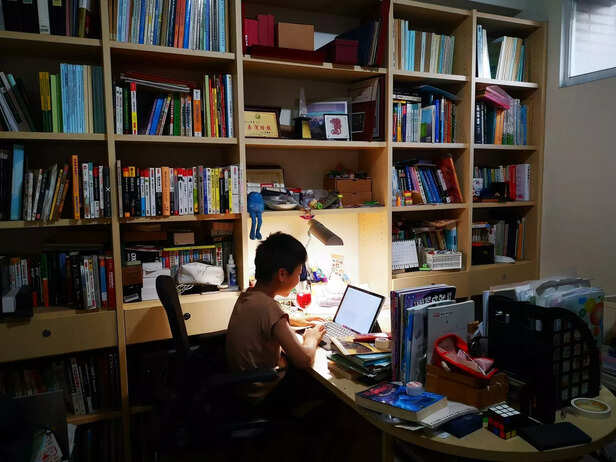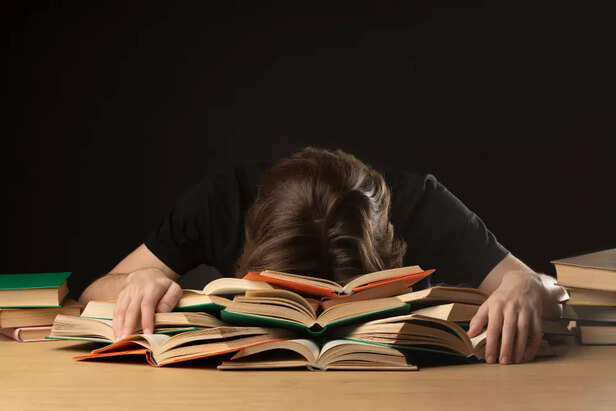Why Indian Students Feel Emotionally Exhausted by the Time They Turn 21
Annanya Saxena | Sep 05, 2025, 14:30 IST
Sad woman
( Image credit : Freepik )
Why do so many Indian students feel emotionally exhausted by age 21? The answer lies in the weight of academic pressure, competitive exams, and family expectations. Students juggle long study schedules with future career worries, often leaving little time for hobbies or self-care. By college, many feel burned out and unsure about their path. This article breaks down the reasons behind this growing issue and discusses why emotional well-being is as vital as academic success for India’s youth.
Indian youth face unprecedented psychological stress that begins in early childhood and reaches critical levels by their early twenties. This mental exhaustion stems from an educational culture that prioritizes academic achievement above personal well-being and forces students into predetermined life paths.

Academic stress in India starts when children can barely read. Parents enroll toddlers in multiple activity centers believing this gives competitive advantages. Primary school students already face intense pressure to achieve top rankings in every subject.
Schools display student rankings publicly on classroom walls. Each test becomes a public judgment of worth rather than a learning opportunity. Children quickly absorb the message that their value depends entirely on outperforming classmates instead of personal development.
This relentless comparison culture creates lasting anxiety. Parents regularly question why their child achieved 95% when another student scored 98%. Children begin viewing friends as rivals rather than companions. Learning transforms from discovery into warfare where only winners matter.

Indian students rarely choose their own career paths. Families dictate futures based on social prestige or financial stability. The acceptable options remain limited: medicine engineering or government positions. Deviation means family disappointment.
Students with artistic abilities get forced into science streams. Those interested in humanitarian work hear lectures about poor earning potential. Creative thinking gets systematically destroyed under the banner of "practical decisions."
This imposed direction creates deep internal conflict. Students spend years studying subjects they despise while preparing for examinations they find meaningless. The disconnect between personal interests and forced pursuits generates profound resentment and emotional fatigue.

Indian students endure some of the world's most demanding academic schedules. Typical days begin at 6 AM with regular school followed by coaching classes until 9 PM. Weekends bring additional tutorial sessions and practice examinations.
Sleep becomes an impossible luxury. Most students function on four to five hours of rest nightly while consuming energy drinks to maintain alertness. Their bodies and minds never recover from constant stress.
School holidays transform into intensive preparation periods for entrance examinations. While international peers relax and recharge during breaks Indian students attend accelerated courses and training camps. Rest becomes a foreign concept throughout their educational journey.
Even meals happen between study sessions. Students eat while reviewing notes or listening to recorded lectures. This non-stop routine continues for years without meaningful breaks.

Building friendships becomes impossible when every moment requires academic focus. Students miss birthday celebrations avoid family events and skip social gatherings to maintain grades.
Many teenagers have never attended movies with friends or participated in regular sports. They miss experiences that develop social skills and emotional intelligence. This isolation creates disconnection from peers and broader society.
Romantic relationships get banned as academic distractions. Students learn to suppress normal developmental emotions and desires. They reach adulthood without learning to form meaningful personal connections.
Studying in isolation produces a generation that struggles with teamwork and communication. These interpersonal abilities prove more valuable in actual careers than most academic subjects yet receive zero attention.

Indian society treats psychological problems as personal weakness or family embarrassment. Students experiencing depression anxiety or stress disorders hide their struggles to avoid disappointing parents.
Schools employ counselors only for administrative compliance. Most teachers cannot identify mental health warning signs or provide appropriate support. Focus remains exclusively on academic performance while emotional needs get completely ignored.
Parents typically dismiss their children's stress as normal teenage challenges. Phrases like "everyone experiences this" or "study harder" replace genuine support and understanding. Students learn their emotional requirements don't matter.
Stigma surrounding therapy means most students never receive professional help. They carry psychological burdens alone leading to breakdowns self-harm or worse outcomes that proper intervention could prevent.
By twenty-one many Indian students feel disconnected from their authentic selves. Years of following external expectations leave them unable to identify personal interests strengths or aspirations. The emotional exhaustion runs so deep that even achieving imposed goals feels hollow.
This system produces technically competent adults with severe emotional damage. They struggle with relationships decision-making and finding purpose beyond external approval. The success this intense pressure supposedly creates becomes meaningless when mental health gets destroyed.
Real change requires acknowledging that student emotional well-being equals academic performance in importance. Only then can society raise generations that achieve both success and happiness without sacrificing their humanity in the process.
Explore the latest trends and tips in Health & Fitness, Spiritual, Travel, Life Hacks, Trending, Fashion & Beauty, and Relationships at Times Life!
The Academic Pressure Cooker Begins Early

Study pressure
( Image credit : Freepik )
Academic stress in India starts when children can barely read. Parents enroll toddlers in multiple activity centers believing this gives competitive advantages. Primary school students already face intense pressure to achieve top rankings in every subject.
Schools display student rankings publicly on classroom walls. Each test becomes a public judgment of worth rather than a learning opportunity. Children quickly absorb the message that their value depends entirely on outperforming classmates instead of personal development.
This relentless comparison culture creates lasting anxiety. Parents regularly question why their child achieved 95% when another student scored 98%. Children begin viewing friends as rivals rather than companions. Learning transforms from discovery into warfare where only winners matter.
Dreams Crushed by Family Expectations

Study plan
( Image credit : Unsplash )
Indian students rarely choose their own career paths. Families dictate futures based on social prestige or financial stability. The acceptable options remain limited: medicine engineering or government positions. Deviation means family disappointment.
Students with artistic abilities get forced into science streams. Those interested in humanitarian work hear lectures about poor earning potential. Creative thinking gets systematically destroyed under the banner of "practical decisions."
This imposed direction creates deep internal conflict. Students spend years studying subjects they despise while preparing for examinations they find meaningless. The disconnect between personal interests and forced pursuits generates profound resentment and emotional fatigue.
Superhuman Study Schedules

Study stress
( Image credit : Unsplash )
Indian students endure some of the world's most demanding academic schedules. Typical days begin at 6 AM with regular school followed by coaching classes until 9 PM. Weekends bring additional tutorial sessions and practice examinations.
Sleep becomes an impossible luxury. Most students function on four to five hours of rest nightly while consuming energy drinks to maintain alertness. Their bodies and minds never recover from constant stress.
School holidays transform into intensive preparation periods for entrance examinations. While international peers relax and recharge during breaks Indian students attend accelerated courses and training camps. Rest becomes a foreign concept throughout their educational journey.
Even meals happen between study sessions. Students eat while reviewing notes or listening to recorded lectures. This non-stop routine continues for years without meaningful breaks.
Social Development Gets Sacrificed

Social pressure to study
( Image credit : Unsplash )
Building friendships becomes impossible when every moment requires academic focus. Students miss birthday celebrations avoid family events and skip social gatherings to maintain grades.
Many teenagers have never attended movies with friends or participated in regular sports. They miss experiences that develop social skills and emotional intelligence. This isolation creates disconnection from peers and broader society.
Romantic relationships get banned as academic distractions. Students learn to suppress normal developmental emotions and desires. They reach adulthood without learning to form meaningful personal connections.
Studying in isolation produces a generation that struggles with teamwork and communication. These interpersonal abilities prove more valuable in actual careers than most academic subjects yet receive zero attention.
Mental Health Remains Taboo

Mental health drains
( Image credit : Unsplash )
Indian society treats psychological problems as personal weakness or family embarrassment. Students experiencing depression anxiety or stress disorders hide their struggles to avoid disappointing parents.
Schools employ counselors only for administrative compliance. Most teachers cannot identify mental health warning signs or provide appropriate support. Focus remains exclusively on academic performance while emotional needs get completely ignored.
Parents typically dismiss their children's stress as normal teenage challenges. Phrases like "everyone experiences this" or "study harder" replace genuine support and understanding. Students learn their emotional requirements don't matter.
Stigma surrounding therapy means most students never receive professional help. They carry psychological burdens alone leading to breakdowns self-harm or worse outcomes that proper intervention could prevent.
The Human Cost of Academic Obsession
By twenty-one many Indian students feel disconnected from their authentic selves. Years of following external expectations leave them unable to identify personal interests strengths or aspirations. The emotional exhaustion runs so deep that even achieving imposed goals feels hollow.
This system produces technically competent adults with severe emotional damage. They struggle with relationships decision-making and finding purpose beyond external approval. The success this intense pressure supposedly creates becomes meaningless when mental health gets destroyed.
Real change requires acknowledging that student emotional well-being equals academic performance in importance. Only then can society raise generations that achieve both success and happiness without sacrificing their humanity in the process.
Explore the latest trends and tips in Health & Fitness, Spiritual, Travel, Life Hacks, Trending, Fashion & Beauty, and Relationships at Times Life!
